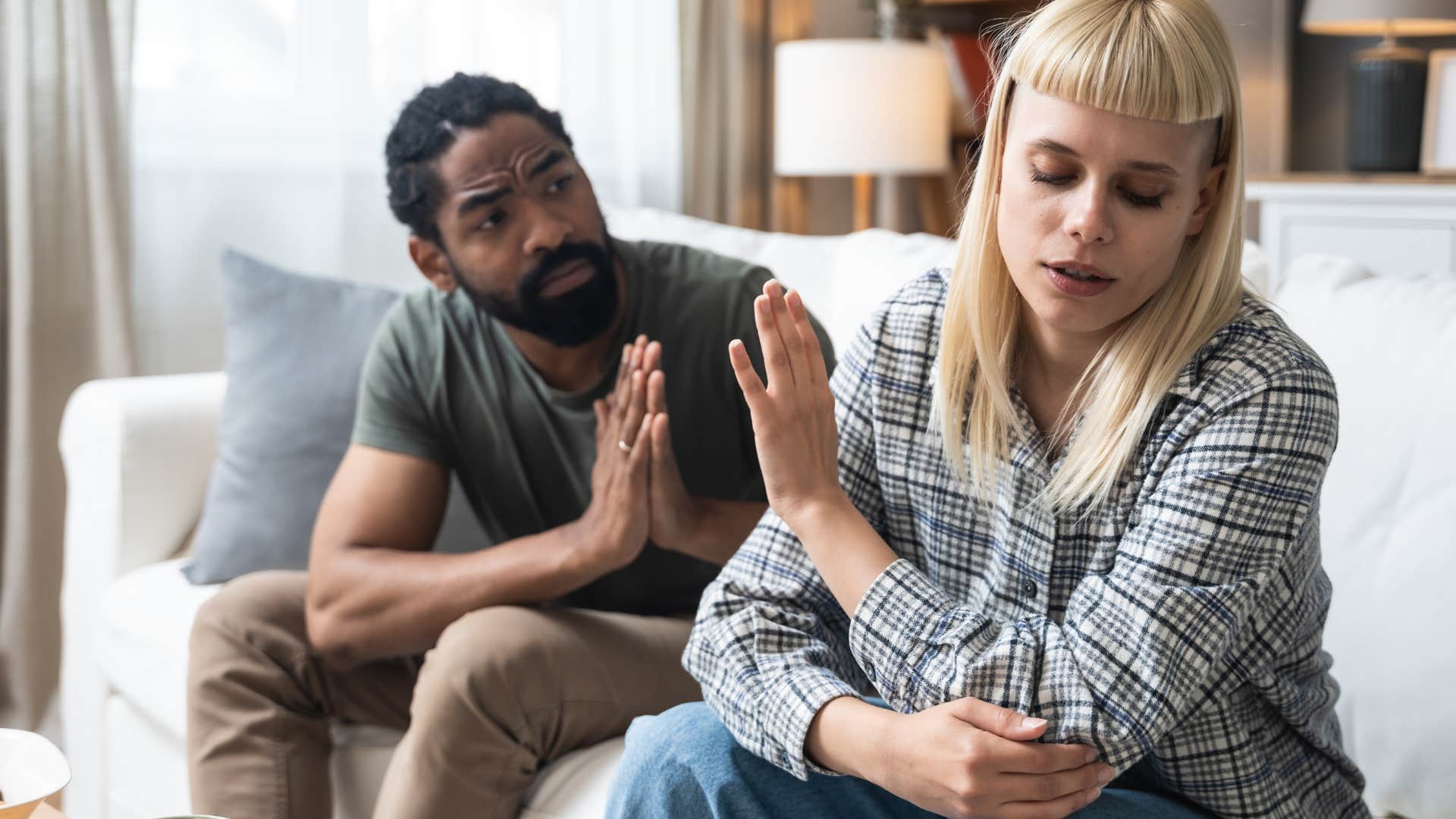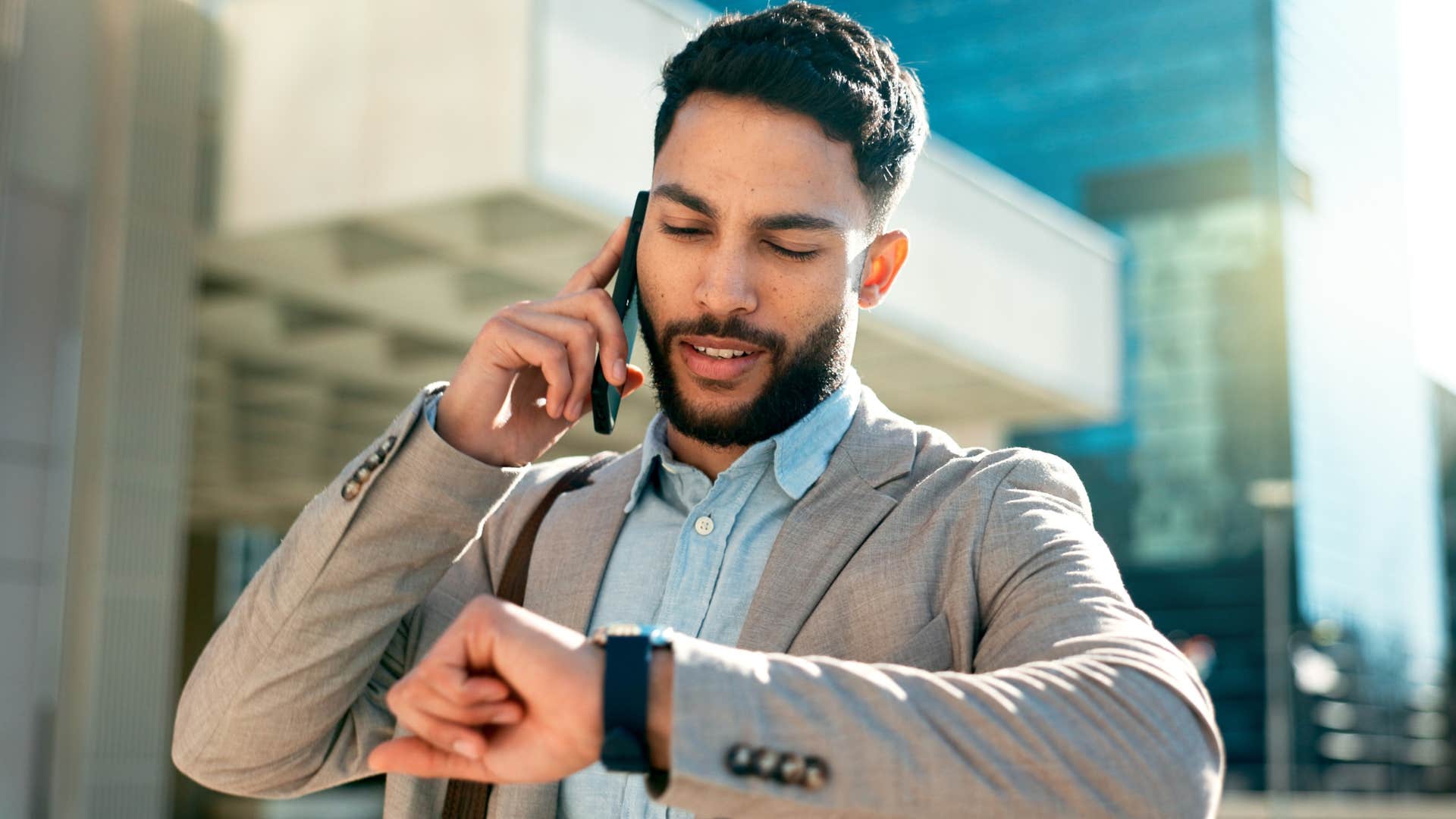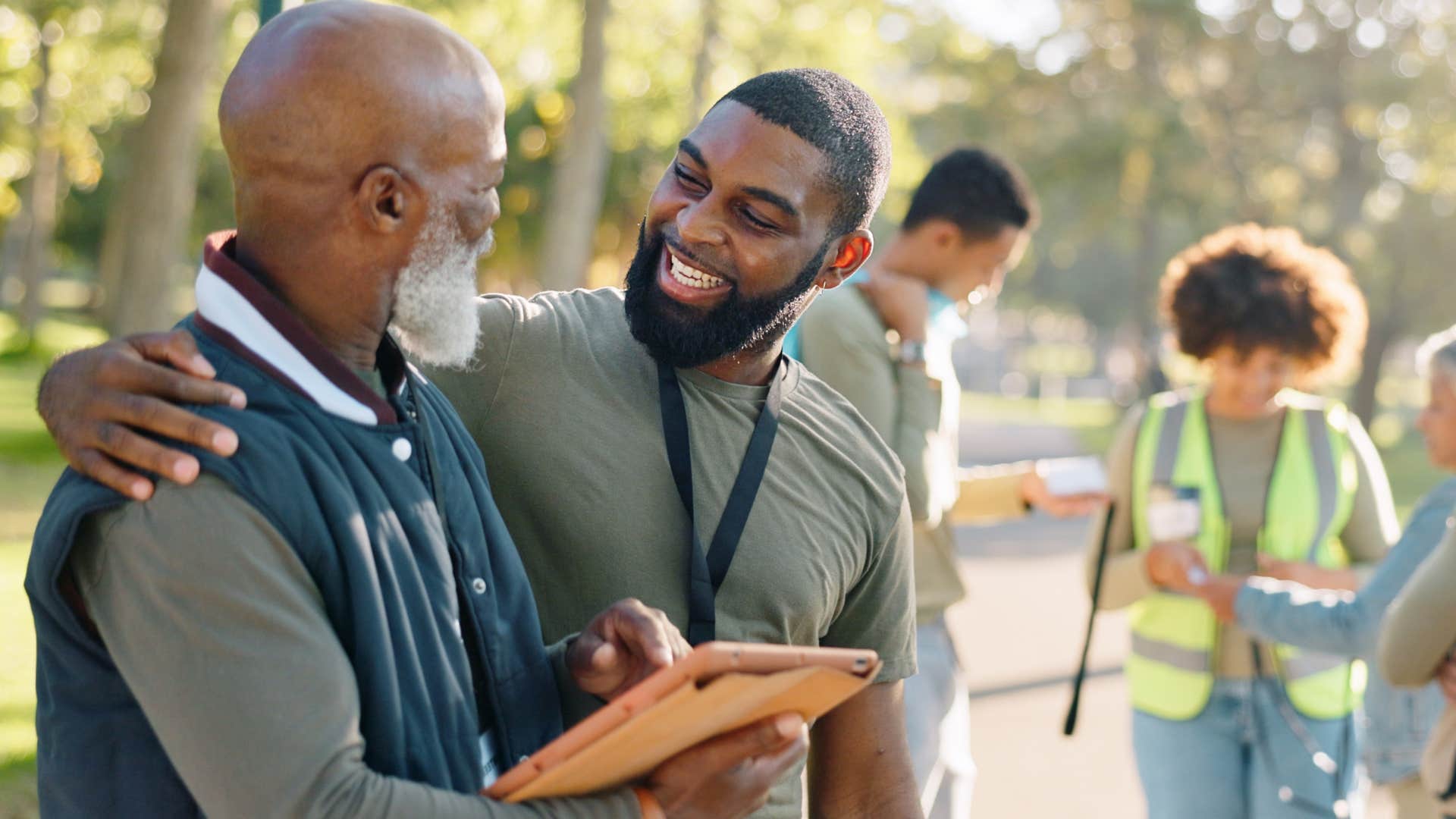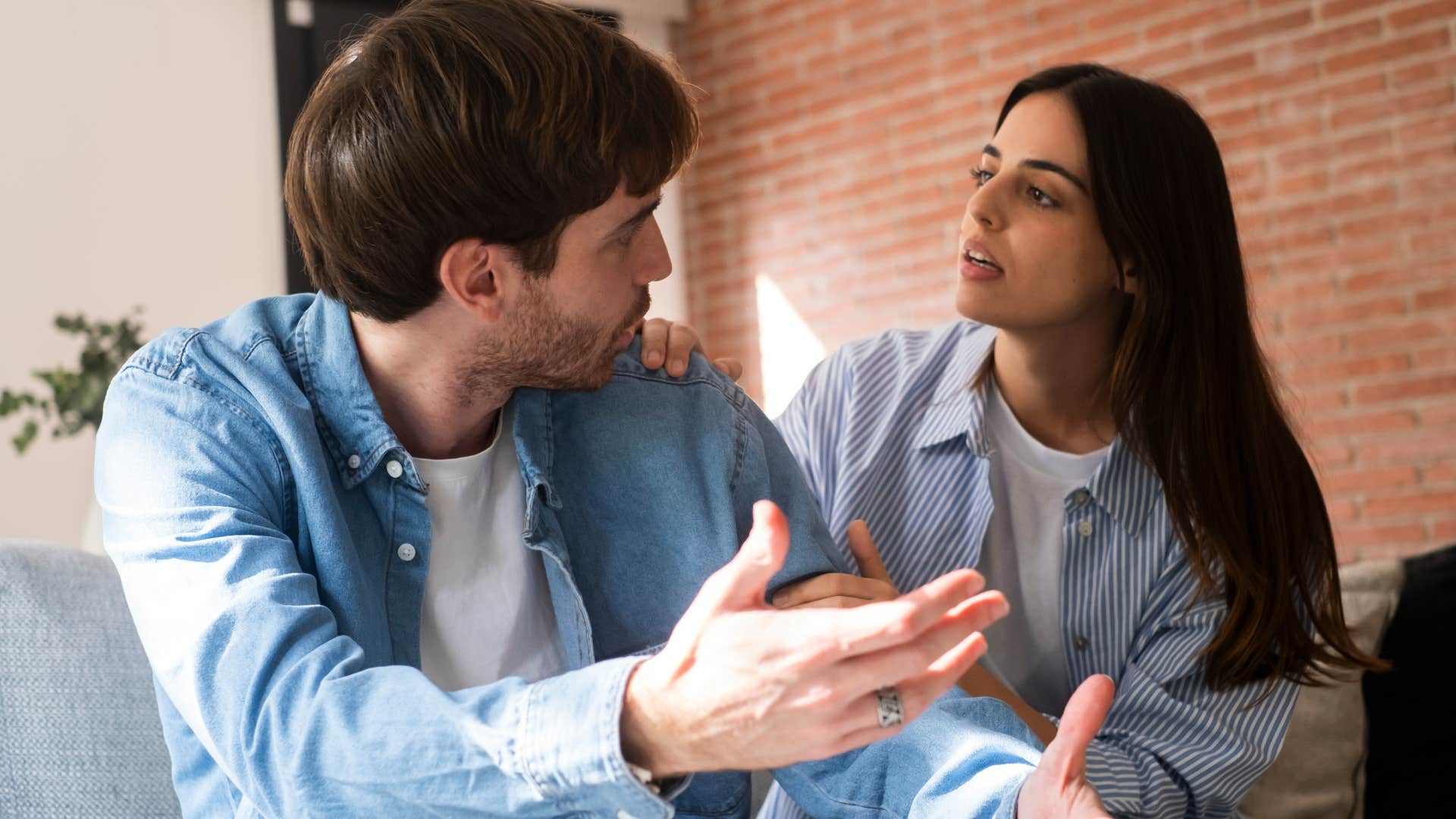11 Signs Someone Feels Insecure Around You But Is Trying To Hide It
A person's envy often says more about them than it does about you.
 Perfect Wave | Shutterstock
Perfect Wave | Shutterstock While there are certainly unique social situations and personal behaviors that can encourage people to feel more insecure or uncomfortable than they typically do, most of the time a person's internal insecurities say more about them than anyone else. Some studies suggest that insecurity is a symptom of mental health struggles, while others name past experiences, relationships, and social behaviors as the root causes.
Regardless of where they stem from, manifestations of insecurity can be uncomfortable to experience and address, especially around other people and in conversations. Not only can they lead to unhealthy behaviors like people-pleasing or overcompensating, they can subtly sabotage relationships and social connections. To address insecurity and better support those struggling around you, it’s important to acknowledge the signs someone feels insecure around you but is trying to hide it.
Here are 11 signs someone feels insecure around you but is trying to hide it
1. They over-apologize
 Mladen Mitrinovic | Shutterstock
Mladen Mitrinovic | Shutterstock
Many people who struggle with low self-esteem are consistently anxious and concerned with taking up too much space in conversations, according to clinical social worker Shahar Lawrence, causing them to over-apologize to others, even when it's not necessary.
Considering they don't feel worthy of other people's time or attention, simply engaging in a conversation with others feels disillusioning, causing them to apologize for making comments and being present. Coupled with some of the other signs someone feels insecure around you but is trying to hide it, a person who profusely apologizes for no reason may be struggling to feel valued or comfortable in conversations.
Of course, this intrinsic insecurity and negative feelings of self-worth typically have nothing to do with the people they're conversing with; rather, they use apologies as a coping mechanism for social interaction.
2. They exhibit nervous body language
 fizkes | Shutterstock
fizkes | Shutterstock
Many insecure people don't have to say anything in a conversation to communicate their insecurity to others. Experiencing low self-esteem and nervousness, many insecure people let their insecurity take over their body, closing off their body language, adopting nervous fidgeting habits, and maintaining a poor posture that ensures they don't feel like they're taking up too much space.
While these tendencies don't often have to do with the people they're speaking to, confidence can be intimidating for someone who's endlessly self-conscious, encouraging them to step back — even if it's with closed body language — and make space for someone that seems more in control.
While it may seem subtle, adopting simple "power poses" in conversation not only help people to foster better conversations and social connections, they can also help to indirectly boost a person's social comfort and confidence — combating manifestations of insecurity that divert attention away from true connection.
3. They seek subtle reassurance in conversations
 Josep Suria | Shutterstock
Josep Suria | Shutterstock
An insecure internal relationship often urges people to seek reassurance, comfort, and validation in others, as they're unable to cope with discomfort themselves.
Considering they don't hold themselves to a high standard, valuing their own opinions and advocating for space for themselves, they're not only more prone to self-critique, they don't hold enough personal power to praise and empower themselves.
They only feel "confident" when someone else acknowledges their success and often only take up space in a conversation when they've been prompted or encouraged by others.
According to postdoctoral research fellow Leah Walsh, PhD, this kind of insecurity can also be integral to a person's attachment with others. They're motivated by a fear of abandonment or rejection that encourages them to always seek reassurance to feel safe.
While they may use passive comments or a sense of misguided confidence in social situations, asking for reassurance is one of the subtle signs someone feels insecure around you but is trying to hide it.
4. They exaggerate their achievements
 Magic Lens | Shutterstock
Magic Lens | Shutterstock
According to psychologist Susan Krauss Whitbourne, many people who feel insecure and inferior to others will try to inflate their ego and exaggerate their perceived achievements to cope with their own feelings of weakness.
By seeking external validation for their accomplishments, they not only get a short-term cure for their discomfort, they feel more worthy of space in social interactions. Of course, this toxic spiral only inflicts more harm on a person struggling with insecurity, despite giving them a subtle and short escape, as it encourages them to seek validation above all else in conversations.
Whether it's bragging about their goals before achieving them, constantly posting for attention on social media, or interrupting people in conversations to make themselves feel more comfortable, exaggerating is one of the signs someone feels insecure around you but is trying to hide it.
5. They belittle or criticize others
 Srdjan Randjelovic | Shutterstock
Srdjan Randjelovic | Shutterstock
Many insecure people resort to criticizing other people to make themselves feel better. By sabotaging other people's sense of peace and confidence, they bring them down to their level, supporting their comfort in social scenarios.
Of course, the judgment insecure people are so afraid of often manifests into self-sabotaging behaviors they rely on to assert superiority or dominance over conversations. Like Harvard psychologist Dr. Cortney Warren argues, these behaviors not only act as one of the signs someone feels insecure around you, they also contribute to a destructive mindset fueled by shame, embarrassment, and resentment.
6. They're always in a rush
 PeopleImages.com - Yuri A | Shutterstock
PeopleImages.com - Yuri A | Shutterstock
Many of the nervous body language habits, like checking a watch or getting distracted, during conversations play into this feeling of always being "in a rush."
Whether it's to seem more important or call attention to a demanding high status job, insecure people may exaggerate their lack of free-time with subtle behaviors like walking fast, glancing down at their phone, or answering phone calls during a conversation.
Especially for insecure people that find confidence or a feeling of misguided self-worth being "needed" in their professional career, reminding other people that they're busy can make them feel more important.
7. They're subtly competitive, rather than collaborative
 fizkes | Shutterstock
fizkes | Shutterstock
Many insecure people often seek control over conversations and social situations to combat feelings of inferiority — criticizing others, being overly competitive, and dismissing other people's accomplishments to make themselves feel better.
While these subtle competitive gestures and feelings of defensiveness may be subtle at first, they're some of the signs someone feels insecure around you but is trying to hide it.
Even if someone is simply exuding confidence or magnetic energy in social situations, an insecure person can feel indirectly challenged, needing to be the most important person and the center of attention to feed their own ego.
8. They avoid group conversations
 MAYA LAB | Shutterstock
MAYA LAB | Shutterstock
Motivated by a fear of abandonment and judgment in social interactions, many insecure people who rely on external validation to feel secure will avoid group conversations and collaborative environments.
Rather than try to make new connections and put themselves at risk for being judged, they rely on a few people they're most comfortable with and who they know will put their own well-being to the side to reassure them.
Of course, this general avoidance of group conversations isn't always one of the signs of an insecure person. According to a 2021 study, many narcissistic people motivated by insecurity rely on a misguidedly grandiose sense of self and confidence to assert themselves in conversations. But it can be a subtle defense mechanism for people in the presence of an intimidating person or event.
9. They're overly positive
 PeopleImages.com - Yuri A | Shutterstock
PeopleImages.com - Yuri A | Shutterstock
While environments fueled by an intense sense of uncertainty and anxiety tend to generally spark greater feelings of optimism in social situations, according to a study led by the University of Amsterdam, an insecure person's reliance on positivity can be overextended and exaggerated.
Trying to exhibit a greater sense of confidence in the face of their self-doubt, insecure people may be overly positive to appeal to more people and make themselves more approachable in conversation.
While it may be subtle, this people-pleasing technique is a clear defense mechanism against rejection. They'd rather avoid confrontation and conflict with an inauthentic positivity than express themselves and their needs.
10. They compare themselves to others
 simona pilolla 2 | Shutterstock
simona pilolla 2 | Shutterstock
Many insecure people are especially sensitive to the symptoms of a toxic comparison culture, where they feel motivated to align their feelings of self-esteem and self-worth with other people, rather than themselves. In order to feel proud and accomplished, insecure people look to other people for validation, comparing their success with other people to feel comfort.
While this behavior can be subtle, especially in a conversation with someone you don't know well, acknowledging small comparisons can help you to see the signs someone feels insecure around you but is trying to hide it. From comparing your outfits and appearance to "one-upping" others in conversations, a person reliant on comparisons to feel secure is coping with insecurity.
11. They avoid eye contact
 MAYA LAB | Shutterstock
MAYA LAB | Shutterstock
According to a study published by the Personality and Social Psychology Bulletin, people who avoid eye contact in conversations often appear less competent and confident than those who make an effort to maintain it. Of course, insecure people often don't avoid eye contact intentionally, but rather, to cope with their own discomfort or anxiety in social situations.
To minimize themselves around others and avoid taking up too much space in conversations, insecure people may close off their body language or avoid eye contact to see smaller, afraid of being judged or criticized by others in the same way they treat themselves.
Zayda Slabbekoorn is a staff writer with a bachelor's degree in social relations & policy and gender studies who focuses on psychology, relationships, self-help, and human interest stories.
